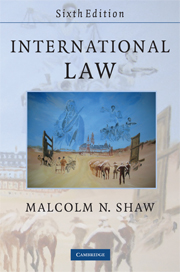Book contents
- Frontmatter
- Contents
- Preface
- Table of cases
- Table of treaties and selected other international instruments
- List of abbreviations
- 1 The nature and development of international law
- 2 International law today
- 3 Sources
- 4 International law and municipal law
- 5 The subjects of international law
- 6 The international protection of human rights
- 7 The regional protection of human rights
- 8 Individual criminal responsibility in international law
- 9 Recognition
- 10 Territory
- 11 The law of the sea
- 12 Jurisdiction
- 13 Immunities from jurisdiction
- 14 State responsibility
- 15 International environmental law
- 16 The law of treaties
- 17 State succession
- 18 The settlement of disputes by peaceful means
- 19 The International Court of Justice
- 20 International law and the use of force by states
- 21 International humanitarian law
- 22 The United Nations
- 23 International institutions
- Some useful international law websites
- Index
9 - Recognition
Published online by Cambridge University Press: 05 June 2012
- Frontmatter
- Contents
- Preface
- Table of cases
- Table of treaties and selected other international instruments
- List of abbreviations
- 1 The nature and development of international law
- 2 International law today
- 3 Sources
- 4 International law and municipal law
- 5 The subjects of international law
- 6 The international protection of human rights
- 7 The regional protection of human rights
- 8 Individual criminal responsibility in international law
- 9 Recognition
- 10 Territory
- 11 The law of the sea
- 12 Jurisdiction
- 13 Immunities from jurisdiction
- 14 State responsibility
- 15 International environmental law
- 16 The law of treaties
- 17 State succession
- 18 The settlement of disputes by peaceful means
- 19 The International Court of Justice
- 20 International law and the use of force by states
- 21 International humanitarian law
- 22 The United Nations
- 23 International institutions
- Some useful international law websites
- Index
Summary
International society is not an unchanging entity, but is subject to the ebb and flow of political life. New states are created and old units fall away. New governments come into being within states in a manner contrary to declared constitutions whether or not accompanied by force. Insurgencies occur and belligerent administrations are established in areas of territory hitherto controlled by the legitimate government. Each of these events creates new facts and the question that recognition is concerned with revolves around the extent to which legal effects should flow from such occurrences. Each state will have to decide whether or not to recognise the particular eventuality and the kind of legal entity it should be accepted as.
Recognition involves consequences both on the international plane and within municipal law. If an entity is recognised as a state in, for example, the United Kingdom, it will entail the consideration of rights and duties that would not otherwise be relevant. There are privileges permitted to a foreign state before the municipal courts that would not be allowed to other institutions or persons.
It is stating the obvious to point to the very strong political influences that bear upon this topic. In more cases than not the decision whether or not to recognise will depend more upon political considerations than exclusively legal factors.
- Type
- Chapter
- Information
- International Law , pp. 444 - 486Publisher: Cambridge University PressPrint publication year: 2008



